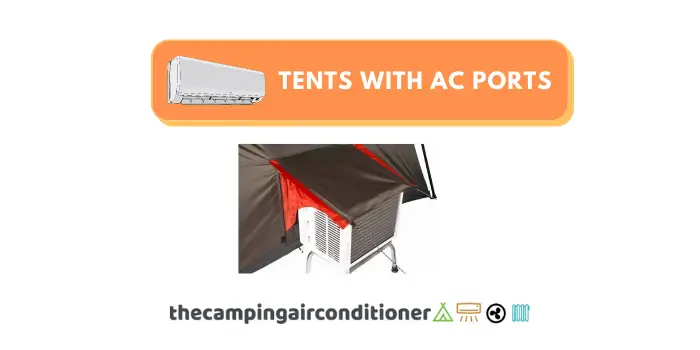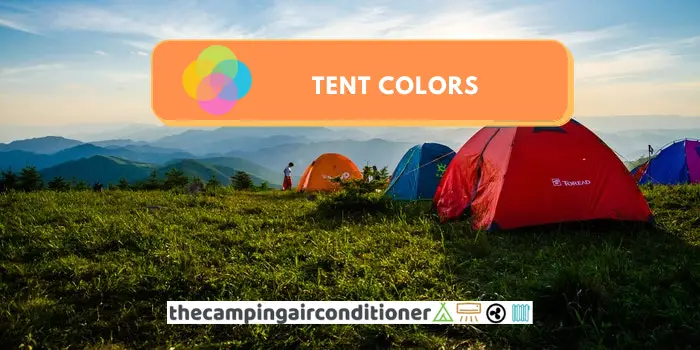Among the essential camping gear, tents are undoubtedly the number one. A tent will protect you from rain, wind, extreme sun, animals and be your relaxing spot after a long hike trail or great camping day.
When searching for the best camping tent, you will find many alternatives in the market. They will vary according to their size, price, special features, and many other options.
However, one of the crucial tent elements is its material. So, what are tents made of?
Overall, the materials used to manufacture tents are:
- Polyester
- Canvas/Cotton
- Nylon
- Others (polyester-cotton, DCF, etc)

Most tents are made from polyester, nylon, cotton. Each material has its benefits and drawbacks and might suit specific camping preferences and weather conditions. Overall, our recommendation is to choose a modern camping tent, with robust material yet lightweight.
If you want to choose a suitable material for your outdoor days, keep reading this detailed article. It presents all the advantages and disadvantages of each tent material, and we hope by the end of it you will be able to choose the most suitable tent for your needs correctly.
By the way, The Camping Air Conditioner is sponsored by readers. When you buy through one of our links, we may earn an affiliate commission at no extra cost to you.
What are tents made of?
As previously mentioned, tents can be built with different materials. Currently, most tents are made from polyester, canvas, and nylon. Overall, these three materials can withstand adverse weather conditions, thanks to their robust coating on the surface.
However, each of them comes with specific characteristics that you should thoroughly evaluate before picking your preferred option.
Polyester - The Material
Polyester is the contraction of the term polyethylene terephthalate (PET). It is a synthetic material, which means that it was created by the human being to imitate a natural cloth. More specifically, the polyester was invented by British chemists around 1940 and it is still widely used different industries.
Originated from polymerization, polyester is made of petroleum derivatives, water and air, which are exposed to a long manufacturing process using different temperature and pressure conditions.
As a consequence, it comes with special features, such as:
- Durability – Polyester fibers are robust and very difficult to tear. Overall, it is a chemical-resistant material and does not stretch, shrink, or wrinkle, retaining its shape. Therefore, if you pick a tent with this material, you should not worry about tent replacement anytime soon.
- Waterproof – Due to its manufacturing process and the tight space between its fibers, polyester is hydrophobic and quickly dries. Thus, it suits well for outdoor clothing and gear manufacturing. However, these same features make the material less breathable, which can create a moisture trap inside your tent.
- Easy maintenance – Because of the features mentioned above, tents made with this material are easy to clean and maintain. You can easily wash your tent and expects it to be dry in a matter of minutes.
Some of its drawbacks are:
- Non-biodegradable – Unlike many natural fibers, Polyester is non-biodegradable, which means that it can take several years to decompose.
- Rough texture – Depending on the manufacturing process, it can be coarse.
- Overall, synthetic fibers are not resistant to UV rays and can deteriorate and wear off after prolonged sun exposure.
Polyester Tents
Polyester is the common material for tent fabrics. This material is affordable, and it can withstand different types of weather. As detailed before, polyester materials are incredibly durable and can come with additional coats to improve their performance, especially water resistance.
Advantages of polyester tents
- It is lightweight. If you decide to purchase a tent made from polyester, you won’t have to worry about carrying it
- Polyester does not shrink or get heavy when it gets wet. Even when it is wet, a polyester tent can be brought down and packed quickly, and it will remain lightweight.
- Overall, it is one of the cheapest options.
- It can easily maintain its stability and shape during rainfall or wind.
- A polyester-made tent is water-resistant, making it ideal for rainy conditions. Because they don’t absorb water easily, they do not get saggy or heavy such that carrying will be hard.
- The other plus of polyester tents is their superior resistance to UV rays.
Disadvantages of polyester tents
- With a last of use, a polyester-made tent won’t serve you for long
- Because the material is not breathable, you will see more condensation in your tent. Further, you can suffer from the heat trapped in your tent.
- It doesn’t offer much insulation – you might need a tent heater or a tent air conditioner)
- With excess exposure to harsh sunlight rays, the coating on the surface might be damaged, exposing you to UV rays.
- Compared to nylon, polyester is less stretchable
- It is non-biodegradable and made of a non-renewable resource. Therefore, it is not an eco-friendly solution.
Polyester tent - Our Recommendations
For up to 4 people – KAZOO Waterproof Backpacking Tent Ultralight 4 Person Lightweight
- It Comes with two doors – easier access for multiple people.
- Spacious and easily fits four campers.
- Waterproof – ideal for rainy conditions.
- Two porch areas, ensuring optimal camping conditions
- Ceiling vents specifically designed to provide better ventilation.
For up to 10 people – CORE 10 Person Straight Wall Cabin Tent
- Straight Walls with Spacious Interior – Move around freely in this giant tent.
- Water Resistant Exterior – Durable polyester – 68D
- Electric Access Ports – Easy to pass an power cable through to run your electrical devices.
- Advanced Venting System – To keep your tent cool on warm evenings, the tent adjusts vent ports that draw cool air in from the ground and expels hot air out through a large mesh ceiling for ample cross-ventilation.
Canvas - The Material
Known for its durability, strength and sturdiness, the canvas is a plain-woven fabric made of cotton and linen. It can be blended with synthetic fibers and coats during its manufacturing process to improve its resistance to water infiltration. Combined these features offer a great outdoor fabric alternative.
The manufacturing process for canvas consists of firmly weaving yarns in a plain weave. The vertical threads are held on the loom, whilst the horizontal is introduced by crossing under and over the vertical warp.
A curiosity about Canvas:
Canvas is a derivative of the latim word “cannabis”, as it was firstly woven with cotton and hemp. Around 1500 BC, the Indians started to replace the hemp by cotton.
Because of its tightly woven yarns, the main characteristics of the canvas are:
- Sturdiness and durability: It is a strong fabric and difficult to tear. Canvas is known for its heavy-duty features, presenting an excellent alternative for outdoor camping gear.
- Waterproof – Canvas fabric has great waterproof features, enhanced by extra PVC coating layers. Some coating treatments can qualify the material with “marine grade”, allowing it to be used as sails and awning.
- Heavyweight – Overall, this material is significantly heavier than nylon and polyester tents.
-
Breathability – The lack of space between the yarns and threads, make the material less breathable than other cotton alternatives.
Eco-Friendly – Major part of its composition is biodegradable (cotton)
Canvas tents
Overall, campers prefer canvas tents because of their heavy-duty features, which results from their weaving manufacturing process. Canvas tents are also an excellent insulator, ensuring optimal temperatures inside them.
Some people love its style and design, which creates a comfortable and enjoyable atmosphere. These tents are generally used for glamping (luxury camping).

Advantages of canvas tents
- Canvas-made tents are resistant to tear. The double-stitched construction makes it hard to cut, and even if a cut happens, two ply-threads prevent the propagation of the tear
The canvas material is the most sturdy, strong, and durable fabric in the market. With its unique weave construction, it can serve you for at least ten years.
Canvas material has good insulation that ensures you are comfortable in different weather conditions. Its heavy weave helps reduce heat, wind, and noise to make the tent’s interior cozy. Because of its insulation, it is known to be the most comfortable than most tents in the market.
- Cotton can stay cool even in the hot summers, thanks to its low heat retention properties.
Disadvantages of canvas tents
- The cotton canvas material is bulky, and it can’t be used comfortably by backpackers. However, they are the best when camping in a windy location.
Keeping in mind it is a heavy fabric. Therefore, you will need more heavy poles to keep it upright and stable. This makes them useless for light travelers and backpackers
- Cotton canvas is a natural fabric that is prone to mildew and mold. Compared to other materials, maintaining a tent made from cotton canvas is difficult.
- Tents made from cotton canvas can be “pricey”, making them unsuitable for occasional campers or those on a budget. Although this is understandable because they have unique characteristics that ensure it lasts long.
In extreme temperatures, cotton changes colors. Mostly, excess exposure to oil, heat, and dust cause cotton tents to turn yellow.
Our recommendation - Canvas Tents
For up to 8 people – TETON Sports Sierra Canvas Tent
- Great waterproofness and breathability features
- Extremely easy to set up
- Different sizes to match your requirements (from 6 to 12 people)
- Built-in ventilation ports to facilitate air circulation
Nylon - The material
Nylon is also a synthetic polymer made from oil derivatives. It is characterized by its exceptional strength, elasticity, and heavy-duty features. Because of these attributes, the material is used in a wide range of camping apparel, such as tents.
Nylon was created in the decade of 1930s by DuPont. During World War 2, Nylon was widely implemented in the military field, used to produce parachutes and military tents.

Similarly to polyester, it is created via a polymerization reaction, resulting in the following characteristics:
Durability – It has excellent durability, with good wearing and tearing resistance.
Elasticity – the material is highly flexible and able to stretch. Consequently, many sports brands have introduced it in its activewear composition.
Flammability – Even though it can melt if exposed to high temperatures, Nylon has low flammability.
Lightweight – The material is extremely light and easy to carry around.
Maintenance – It is effortless to maintain. You can wash it and let the material dry (it quickly dries)
Cost – It is a low-cost option compared to natural fibers (i.e. cotton/canvas). However, overall, it is more expensive than polyester.
Waterproof – The material is considered waterproof and can be used as outdoor furniture covers, tents, and tarps.
UV/Light Resistant – Nylon can be damaged by long exposure to Ultra-Violet rays. This means that its colour can fade with direct sunlight exposure, and the material can lose its strength and elasticity. However, it can be mixed with other chemicals to improve its performance and resistance.
Non-biodegradable – As previously detailed, its manufacturing process uses oil derivatives and chemical reactions, making it a non-biodegradable option
Nylon Tents
Nylon tents are lightweight, durable and affordable. They usually come with special coatings (polyurethane, silicone, or acrylic) to improve its resistance to different weather conditions.
However, they have limited insulation and might not be a good alternative for hot summer days. Further, as a polymer, it does not have great breathability, which might impact your comfort.
Advantages of Nylon tents
- Nylon tents are stretchy and strong.
- Compared to canvas and polyester fabrics, nylon material has a high strength to weight ratio. Meaning it remains stronger while being lightweight
- Nylon-made tents require less maintenance. They don’t support the growth of mold and mildew, and they are the best for camping in damp areas. You can store them in your preferred spot during the off-season, and they won’t need much attention.
- Nylon tents are abrasion-resistant. It can withstand any abrasive force in the wilderness.
- Some nylon tents have a coating on the surface to resist harsh outdoor conditions.
- Nylon alone is not entirely waterproof, but it is mixed with silicone to make SilNylon. This combination makes nylon waterproof and durable.
- A great option for hikers and backpackers, as nylon tents are extremely light.
Disadvantages of canvas tents
- Compared to polyester, nylon has a low condensation rate, and it is not breathable. If you decide to add a waterproof coating on the outside of the tent, breathability will be decreased. This leads a tent to be stuffy and uncomfortable on hot summer days.
- Even though a nylon tent has some primary resistance to sunlight, when it is excessively exposed to UV rays, its protection layer weakens, and the tent can deteriorate. For instance, if you love to camp in high-altitude areas in the summer, your tent will be highly exposed to UV rays. So, consider getting a UV protection spray to reduce the exposure.
Our recommendation - Nylon Tents
For up to 3 people – Naturehike cloud up (1,2 and 3 campers options)
- Lightweight tent, ideal for hiking and backpacking (2-person tent weights only 2kg!)
- Easy to pitch and store
- Naturehike is well-known for its outstanding quality.
- Special designed vent ports, to improve air circulation.
Others
As the technology evolves, multiple material innovations appear to address campers problems. Hybrid tents combine different materials and leverage their best features. Some other options are detailed below.
Polyester-Cotton Tents
Polyester-cotton tents mix polyester and cotton. According to manufacturers, it finds the sweet spot for breathability, UV resistance, and waterproofness. Whilst the polyester helps with lighter weight and strength, the cotton brings breathability. Further, conversely to canvas tents, you won’t have mold problems.
Cuben Fibers
Being also named Cuben Fiber (DCF) Tents, these tents are made of highly robust fibers. Overall, they are very light but also very expensive compared to nylon, polyester and canvas options.
They have outstanding waterproof features and are easy to carry, being ideal for hikers or backpackers. However, we do not recommend it being your first tent.
FAQ
What is the best tent for summer camping?
If you are camping in summer, you are probably after an option that can provide you with good insulation and breathability. Canvas tents are a great alternative, since they lower heat retention. Be mindful that these tents might be heavier!
What is the best Tent for winter camping?
Rather than recommending a specific material, we suggest checking the tent’s coating specifications. As previously shown, canvas tents offer better insulation, however there are multiple nylon and polyester options with great insulation coatings.
The challenge with polyester and nylon tents is that high humidity levels can cause condensation inside them. If you think you will still feel cold, you can have a look at tent heaters options.
What is best tent for rainy weather?
Nylon and polyester have better waterproofness when compared to other options. However, before buying them have a look at the tent coating specifications. There are numerous coating options, such as polyester urethane (PU), polyether urethane (PE), and silicon. This article details a comparison between PU, PE and silicon coatings.
You can also use Nikiwax, which is an easy to use technical cleaner with UV protection for cotton, canvas and synthetic tents. It cleans and improve waterproofness of your tent, and protects against UV rays.
What is the Best Tent for hiking and backpacking?
If you are backpacking or hiking, you will need a tent that is easy to transport and pitch. We recommend using nylon tents, given their lightweight and resistance. If you are an advanced camper and have an extra budget, have a go at DCF tents.
What is the cheapest tent?
Nylon tents tend to be the cheapest alternative. However, the prices will vary according to coating specifications, tent size, and many other factors.
What is the most expensive tent?
Tends made of Cuben Fiber/DCF tend to be the most expensive ones. The manufacturing process for this type of fiber is complex and costly.
Can you wash your tent? What is the easiest tent to maintain?
Nylon and polyester tents are easier to maintain and wash. They dry quickly and do not create mould. On the other hand, canvas tents require higher maintenance levels and constant monitoring to avoid mould growth.
Can you wash a tent in the washing machine?
We do not recommend washing your tent in the washing machine. It might damage and tear your tent.
Bottomline
We hope that by the end of this article, you have a clear understanding of what tents are made of. As discussed different tent materials will provide you with different advantages and disadvantages.
If you love camping, we recommend having more than one to suit your specific needs. Apart from the material, always check the coating specifications. They can also dramatically improve your experience under a tent.










